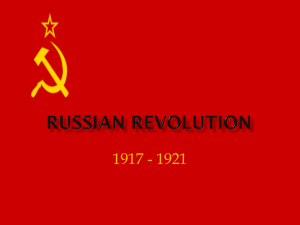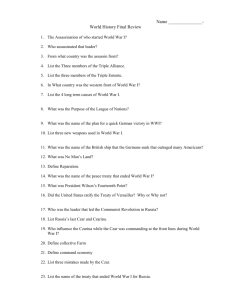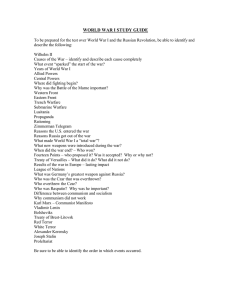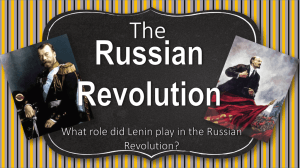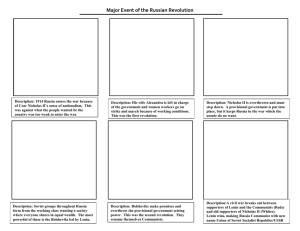1917 - 1921
advertisement
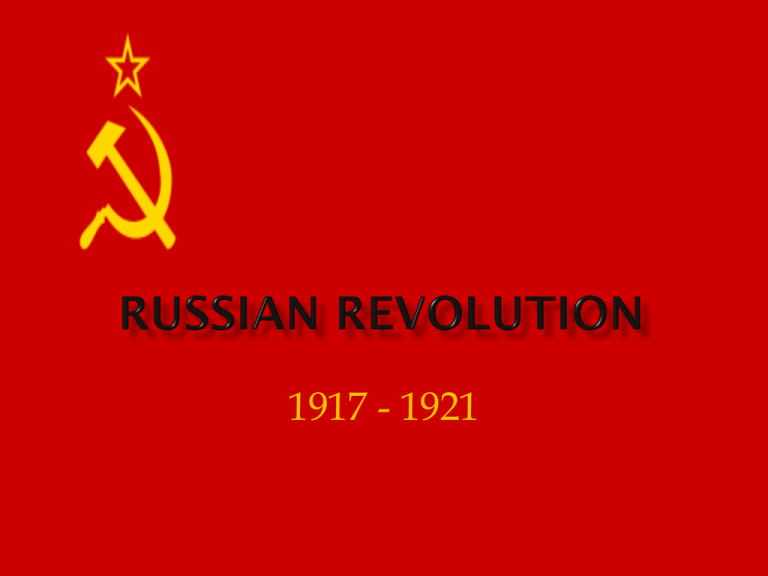
1917 - 1921 Unlike Western European nations, Russia did not industrialize quickly czars unwilling to give up wealth & power. Czars are oppressive, poor leadership & ruthless treatment toward peasants Secret revolutionary groups plot to overthrow government & assassinated Alexander II (he’s for reforms!) Set up autocracy absolute rule or dictatorship Stopped all reforms anyone tagged as a revolutionary or spoke language other than Russian = dangerous Had secret police spy on everyone, including students teachers provided reports Persecuted Jews & had to live in separate areas Followed father refused to give up any power Under him, Russia became 4th largest producer of steel & created Trans-Siberian Railway (longest rail line) Forced rapid industrialization poor working conditions, child labor, low wages, no unions Huge gap between rich & poor; people starting to rise up Russia & Japan both want Korea & Manchuria; tried to sign agreements, but Russia broke them Lost Russo-Japanese War “Bloody Sunday” 1905 200,000 unarmed workers stormed czar’s winter palace with petition for better working conditions & freedoms; soldiers fired at crowd Final blow: World War I defeated at many battles w/Germans, showed weakness of czar Shortages of bread & fuel RASPUTIN Born a peasant in Siberia, Rasputin became a religious teacher, although he was never ordained as a priest. This sinister monk seemed to cast a hypnotic spell on people, especially Czarina Alexandra & her son. Rasputin was known for having mysterious powers. He was reportedly taking control of the country, so in December 1916 a small group of aristocrats planned his assassination. They fed him poisoned cakes, but apparently it had no effect on him. Then, they shot him several times. Assuming he was finally dead, they threw him in the Neva River. When his body was discovered 3 days later, doctors confirmed the cause of his death—drowning. Rasputin’s death sent the czarina into shock. His prediction haunted her: “If I die or you desert me, in six months you will lose your son and your throne For about 65 years after the execution of Czar Nicholas II & his family, a woman named Anna Anderson claimed that she was the Grand Duchess Anastasia, the czar’s sole surviving daughter. According to Anna, she managed to escape her assassins. Anna’s regal manners & detailed knowledge about the Romanov family convinced many that she was telling the truth. Others believed she was a fraud seeking personal gain. Anna held fast to her story until her death in 1984. In 1993, scientists finally solved the 75-yearold mystery. Prince Philip of Britain is a living descendant of Czarina Alexandra. Scientists compared his DNA to Anna Anderson’s. The DNA proved that Anna was not a blood relative of the Romanovs. Instead, she carried the DNA of polish peasants. Czar Nicholas & family executed Romanov rule ended Revolutionary group after Nicholas II followed views of Karl Marx & wanted radical change Leader: LENIN (Vladimir Ilyich Ulyanov) Great organizer & personality, but ruthless guy Fled country until his party fully took control Peasants want land City workers want better working conditions Revolutionaries form SOVIETS : local councils of workers, peasants, & soldiers had more influence than Provisional Government LENIN RETURNS! Germany “helps” believed Lenin would stir up more unrest & hurt Russian war effort Took power slogan, “Peace, Land, & Bread” Bolshevik “Red Guards” took over provisional gov’t in few hours Distributed all farmland to peasants & control of factories to workers Signed Treaty of Brest-Litovsk (Russia out of WWI) Russians humiliated “White Army” tried to stop increasing Bolshevik demand lost Restructuring government New Economic Policy (NEP) was small version of capitalism Allowed peasants to sell surplus of crops vs. turning them over to government & people could buy/sell goods for profit Kept nationalism in check by organizing Russia into several self-governing republics under central government country renamed Union of Soviet Socialist Republics (USSR) Bolsheviks renamed Communist Party Defeat in Russo-Japanese War in 1905 Landless peasantry & horrible working conditions “Bloody Sunday” Incompetence of Czar Nicholas II Repeat military defeats High casualties in World War I
